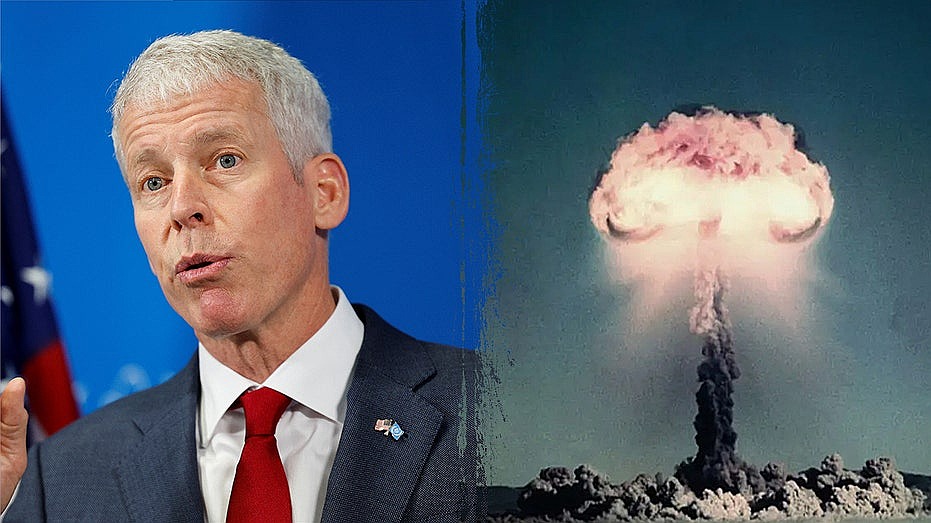Energy secretary reveals how US nuclear tests will work
In a recent interview, U.S. Energy Secretary Chris Wright clarified that the United States will not resume nuclear explosion tests, dispelling concerns that the Trump administration might overturn a long-standing global moratorium on nuclear testing. Instead, Wright emphasized that any future tests would focus on “systems tests,” which he described as “noncritical explosions” that do not involve nuclear detonations. This announcement follows President Donald Trump’s controversial statement suggesting a return to nuclear testing, citing the actions of other nations such as China and Russia. Trump’s comments, made during a trip to meet with Chinese President Xi Jinping, raised alarms about a potential arms race, especially as he claimed that adversaries were conducting secret nuclear tests.
The backdrop of this discussion is significant, particularly considering the historical context of nuclear testing. The last U.S. nuclear explosion occurred in 1992, and since then, the global landscape has changed dramatically. North Korea is the only country to have conducted a nuclear test in the past 25 years, with its last detonation in September 2017. While Trump’s administration has indicated a desire to keep pace with other nuclear powers, including Russia and China, who have not conducted tests in decades, the U.S. has maintained a commitment to the principles established by the 1996 nuclear test ban treaty, which, although not ratified by the Senate, has created a global norm against nuclear testing.
Wright pointed out that the U.S. continues to conduct non-explosive tests at the Nevada National Security Site, which involve fissile materials without leading to a chain reaction. These subcritical tests are essential for validating computer models that simulate the behavior of aging warheads, allowing for the verification of performance without the need for explosive testing. As the U.S. embarks on a massive $1.7 trillion modernization effort to replace its aging nuclear arsenal over the next 30 years, these nonnuclear systems tests will play a crucial role in ensuring that new warheads are more advanced and reliable than their predecessors. In summary, while the Trump administration’s rhetoric may suggest a shift towards more aggressive nuclear posturing, the reality remains that the U.S. will continue to adhere to a strategy that prioritizes safety and technological advancement without crossing the line into nuclear testing.
Related articles:
– Link 1
– Link 2
Energy Secretary Chris Wright
revealed the U.S. will not be testing nuclear explosions, putting to rest questions over whether the Trump administration would reverse a decades-old taboo.
Testing will instead involve “the other parts of a nuclear weapon,” Wright told Fox News’ “The Sunday Briefing.”
“I think the tests we’re talking about right now are systems tests,” he explained. “These are not nuclear explosions. These are what we call noncritical explosions.”
His comments came after President Donald Trump announced the U.S. would reignite “nuclear testing” because other nations were doing so. The president made the announcement on the way to a meeting with Chinese President
Xi Jinping
.
WITH A NUCLEAR BACKDROP, TRUMP EASES TENSIONS WITH XI BUT MERELY RETURNS TO THE STATUS QUO
He didn’t specify whether he meant explosives, which haven’t been tested by the U.S. since 1992, or the weapons that carry them.
The only nation to conduct a detonation test in the last 25 years is North Korea in September 2017.
The president said he’d directed
the Pentagon
— which is responsible for testing nuclear-capable vehicles — to resume testing. The Energy Department would have jurisdiction over testing explosives.
TRUMP BREAKS 33-YEAR NUCLEAR TESTING SILENCE AS WORLD BRACES FOR DANGEROUS NEW ARMS RACE
“We’ve halted it years — many years — ago,” Trump said last week. “But with others doing testing, I think it is appropriate that we do also.”
Asked on Friday to clarify whether the U.S. would begin “detonating nuclear weapons for testing,” the president responded, “I’m saying that we’re going to test nuclear weapons like other countries do.”
Trump claimed in a CBS “60 Minutes” interview over the weekend that U.S. adversaries were secretly testing nuclear weapons.
“Russia’s testing nuclear weapons, and China’s testing them, too,” he said. “You just don’t know about it.”
China is rapidly expanding its nuclear silo and is expected to have nearly 1,000 warheads by 2030, according to Pentagon assessments. But Beijing has not conducted a nuclear weapons test since 1996. Russia has not been confirmed to have tested a weapon since 1990, but last week did claim to test two delivery vehicles: an undersea torpedo known as Poseidon and a nuclear-powered cruise missile.
In 1996, the United Nations adopted a nuclear test ban treaty. The U.S. signed the treaty, but the Senate rejected its ratification. Most other nuclear-armed states also did not ratify the document.
Still, it created a global norm against nuclear weapons testing.
The U.S. regularly tests unarmed nuclear-capable weapons.
Additionally, non-explosive or “subcritical” tests, which involve fissile materials but stop short of producing a chain reaction, have been conducted at the Nevada National Security Site for years. Officials say these experiments help validate computer models that simulate how aging warheads behave, allowing scientists to verify performance without explosive testing.
The U.S. has conducted more than two dozen such tests since the late 1990s.
“And again, these will be nonnuclear explosions,” Mr. Wright said. “These are just developing sophisticated systems so that our replacement nuclear weapons are even better than the ones they were before.”
Washington is currently undergoing a three-decade, $1.7 trillion transformation effort to replace aging warheads with updated versions.
Eric
Eric is a seasoned journalist covering US Politics news.



